|
|
|
Sort Order |
|
|
|
Items / Page
|
|
|
|
|
|
|
| Srl | Item |
| 1 |
ID:
106065


|
|
|
| 2 |
ID:
155116
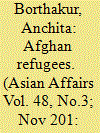

|
|
|
|
|
| Summary/Abstract |
One of the most important arenas that have been profoundly affected by the security situation in Afghanistan is Pakistan's internal security environment. The instability in Afghanistan has had a negative spill-over effect on Pakistan's domestic security scenario, as the Afghan quagmire poses immense implications on Pakistan's domestic framework. One of the important consequences of the Afghan conflict since the 1970s has been the massive inflow of the Afghan refugee population to the neighbouring Pakistan which in following years has brought about a number of demographic and security challenges to the Pakistani society. Therefore along with a number of factors, at this present juncture, Afghan refugees have also become a principal factor in determining Pakistan's Afghanistan policy.
|
|
|
|
|
|
|
|
|
|
|
|
|
|
|
|
| 3 |
ID:
068529
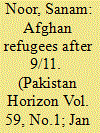

|
|
|
| 4 |
ID:
179060
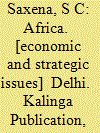

|
|
|
|
|
| Publication |
DelhI, Kalinga Publication, 2001.
|
| Description |
403p.hbk
|
| Standard Number |
8187644281
|
|
|
|
|
|
|
|
|
|
|
|
Copies: C:1/I:0,R:0,Q:0
Circulation
| Accession# | Call# | Current Location | Status | Policy | Location |
| 060024 | 382.096/SAX 060024 | Main | On Shelf | General | |
|
|
|
|
| 5 |
ID:
104671
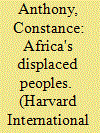

|
|
|
| 6 |
ID:
149783
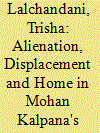

|
|
|
|
|
| Summary/Abstract |
In the absence of a linguistically defined region of their own, the migration of Sindhi Hindus to India was particularly painful and humiliating. It propelled the refugees to either embrace homogenisation or move into unknown territory. Mohan Kalpana's Jalavatni is a rare document in Partition literature. It brings to the literary archive of Partition a hard-hitting voice hitherto missing—the voice of rage at the hostility of the host nation rather than a gruesome account of violence, the struggle for home, the paucity of resources, and the rejection associated with identity. This paper introduces the reader to this untranslated and hence unknown story of amorphous citizenship and estrangement in the wake of Partition.
|
|
|
|
|
|
|
|
|
|
|
|
|
|
|
|
| 7 |
ID:
106319
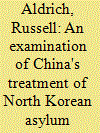

|
|
|
|
|
| Publication |
2011.
|
| Summary/Abstract |
Every year thousands of North Koreans illegally cross into China to escape the abject poverty and oppression that is endemic in their home country, and many are captured by Chinese authorities and returned to their homeland where they face harsh repercussions. To avoid culpability under international law, China maintains that the North Koreans are not refugees but rather "economic migrants," and that therefore they do not qualify for protection under the 1951 United Nations Convention Relating to the Status of Refugees. This paper examines this argument and concludes that it is invalid.
|
|
|
|
|
|
|
|
|
|
|
|
|
|
|
|
| 8 |
ID:
173271
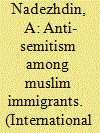

|
|
|
|
|
| Summary/Abstract |
EXPERTS have for years been pointing to mounting xenophobic, anti-immigrant, and radical sentiments among the population of Europe. However, recently it is not only refugees and economic migrants from the Middle East and North Africa (MENA region) who have been facing hostility but also Jews who have lived in Europe permanently and have been integrated into European society. Usually, European anti-Semitism has been blamed on right-wing extremists and radicals, especially those in Hungary and Poland.1 There occur random instances of trivial anti-Semitic behavior, for example at school or in companies, that are not investigated or taken into account in police statistics.
|
|
|
|
|
|
|
|
|
|
|
|
|
|
|
|
| 9 |
ID:
150406


|
|
|
| 10 |
ID:
138414
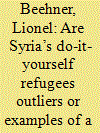

|
|
|
|
|
| Summary/Abstract |
Refugee camps are often treated as incubators of social unrest, violence, terrorism, and illicit trade. This provokes their overseers in the United Nations (UN) and other relief agencies to conduct frequent social engineering to enhance the camps’ legibility. Hence, we see orderly, perpendicular rows, standardized units from redistricting to the allocation of diapers, and so forth—all of the follies of high modernism that James Scott predicted in "Seeing Like a State," but writ small. Indeed, my qualitative research from the Za’atari refugee camp, located in Jordan along the Syrian border, indicates that refugees, especially middle-class ones like Syria’s, rebel against uniformity—or what Scott describes as “metis”—and seek to recreate their domiciles as best they can from the meager canvas tents and campers allotted to them. Put simply, they see their surroundings more as the disorderly “sidewalk ballet” of Jane Jacobs’ Greenwich Village than the high modernist yet sterile functionalism of Robert Moses. This holds important policy implications for the future of how we devise refugee camps, which increasingly resemble small cities; how we settle internally displaced persons (IDPs); and how we deal with the aftermath of mass population displacements. From direct cash transfers to the districting of refugees, some bureaucratic flexibility is required but so is an acknowledgement and embrace of refugees’ do-it-yourself ethos that is rooted in their resistance to authority and trauma from violence. Drawing from the literature in social anthropology and political science, this article presents new evidence from Za’atari that disputes the utility of a high modernist approach to the social engineering of large displaced populations.
|
|
|
|
|
|
|
|
|
|
|
|
|
|
|
|
| 11 |
ID:
005959
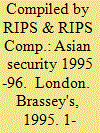

|
|
|
|
|
| Publication |
London, Brassey's, 1995.
|
| Description |
x,261p.
|
| Standard Number |
1-85753-113-2
|
|
|
|
|
|
|
|
|
|
|
|
Copies: C:1/I:0,R:0,Q:0
Circulation
| Accession# | Call# | Current Location | Status | Policy | Location |
| 037443 | R 327.1106095/RIP 037443 | Main | On Shelf | General | |
|
|
|
|
| 12 |
ID:
001088
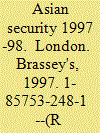

|
|
|
|
|
| Publication |
London, Brassey's, 1997.
|
| Description |
x,250p.
|
| Standard Number |
1-85753-248-1
|
|
|
|
|
|
|
|
|
|
|
|
Copies: C:1/I:0,R:0,Q:0
Circulation
| Accession# | Call# | Current Location | Status | Policy | Location |
| 040623 | R 327.1106095/RIP 040623 | Main | On Shelf | General | |
|
|
|
|
| 13 |
ID:
081367
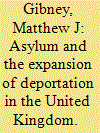

|
|
|
|
|
| Publication |
2008.
|
| Summary/Abstract |
Deportation has traditionally been seen as a secondary instrument of migration control, one used by liberal democratic states relatively infrequently and with some trepidation. This secondary status has been assured by the fact that deportation is both a complicated and a controversial power. It is complicated because tracking individuals down and returning them home are time-consuming and resource-intense activities; it is controversial because deportation is a cruel power, one that sometimes seems incompatible with respect for human rights. In the light of these constraints, how can one explain the fact that since 2000 the United Kingdom has radically increased the number of failed asylum seekers deported from its territory? I argue in the article that this increase has been achieved through a conscious and careful process of policy innovation that has enabled state officials to engage in large-scale expulsions without directly violating liberal norms.
|
|
|
|
|
|
|
|
|
|
|
|
|
|
|
|
| 14 |
ID:
120033
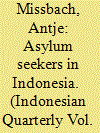

|
|
|
| 15 |
ID:
093220


|
|
|
| 16 |
ID:
059611
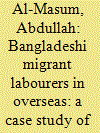

|
|
|
|
|
| Publication |
Jun-Dec 2004.
|
|
|
|
|
|
|
|
|
|
|
|
|
|
|
|
| 17 |
ID:
183177
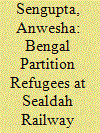

|
|
|
|
|
| Summary/Abstract |
This article focuses on the Sealdah railway station in Calcutta, West Bengal, as a site of refugee ‘settlement’ in the aftermath of British India’s partition. From 1946 to the late 1960s, the platforms of Sealdah remained crowded with Bengali Hindu refugees from East Pakistan. Some refugees stayed a few days, but many stayed for months, even years. Relying on newspaper reports, autobiographical accounts and official archives, this article elaborates how a busy railway station uniquely shaped the experiences of partition refugees. Despite severe infrastructural limitations, the railway platforms of Sealdah provided these refugee residents with certain opportunities. Many preferred to stay at Sealdah instead of moving to any government facility. However, even for the most long-term residents of Sealdah, it remained a temporary home, from where they were either shifted to government camps or themselves found accommodation in and around Calcutta. The article argues that by allowing the refugees to squat on a busy railway platform for months and years, the state recognised a unique right of these refugees, their right to wait, involving at least some agency in the process of resettling.
|
|
|
|
|
|
|
|
|
|
|
|
|
|
|
|
| 18 |
ID:
152996
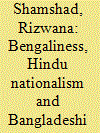

|
|
|
|
|
| Summary/Abstract |
Abstract
Hindu nationalists made migration from Bangladesh an election campaign in West Bengal during the 1990s. Although there were various allegations against Bangladeshi migration, it never became a mainstream political issue in the state, like in neighbouring Assam. West Bengal shares the longest border with Bangladesh, compared to any other Indian state, and hosts a large number of Bangladeshi migrants, according to the Census reports in India. West Bengal and Bangladesh share a common ethnicity, both are predominantly Bengali. Can this shared Bengaliness explain why Bangladeshi migration did not become a divisive political issue in the state? If this sameness is a bonding factor, what about the Ghoti-Bangal differences? Drawn from in-depth interviews with the representatives of West Bengal’s key civil society organisations and political parties, I argue that a particular historical and cultural process, unique to West Bengal and Bangladesh, has shaped the current attitude towards Bangladeshi migrants in the state.
|
|
|
|
|
|
|
|
|
|
|
|
|
|
|
|
| 19 |
ID:
075218
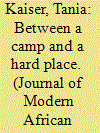

|
|
|
|
|
| Publication |
2006.
|
| Summary/Abstract |
Drawing on qualitative research with refugees in and outside formal settlements, this article challenges characterisations of Uganda's UNHCR-supported refugee settlement system as un-problematically successful. It shows that by denying refugees freedom of movement, the settlement system undermines their socio-economic and other rights. Refugees who remain outside the formal system of refugee registration and settlement are deprived of the refugee status to which they are entitled under international law. The article questions the conventional opposition between refugees living in and out of refugee settlements in the Ugandan context, revealing a more complex and interconnected dynamic than is often assumed. It suggests that those refugees with some external support may be able to escape the confines of remote rural settlements, where refugee agricultural livelihoods are seriously compromised by distance from markets, unfavourable climatic conditions, exhausted soil and inadequate inputs. It argues that refugee livelihoods face more rather than fewer challenges as exile becomes protracted, and concludes that the government and UNHCR's Self Reliance Strategy (SRS) has not yet managed to overcome the contradiction inherent in denying people freedom of movement, without supporting them effectively to meet their needs in the places to which they are restricted.
|
|
|
|
|
|
|
|
|
|
|
|
|
|
|
|
| 20 |
ID:
086958
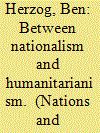

|
|
|
|
|
| Publication |
2009.
|
| Summary/Abstract |
The public and researchers alike view global/humanitarian and local/national logics as based on different, and even contradictory, regimes of justification. In this paper, however, I argue that these logics are complementary in the case of refugees. By asking 'who is a refugee?' within the Israeli case study, I empirically ground the claim that nationalism and humanitarianism should be grasped as Glocal. Content analysis of the Israeli case reveals how the Israeli establishment 'translates' the universal notion of humanitarianism. Humanitarian discourse does not offer an answer to the refugee problem by invoking a universal identity, nor is it just a euphemism for particularistic interests. On the contrary, the humanitarian logic is in fact based on the national order, and does not attempt to replace it. The political meaning of the term 'refugee' is an endless transcription of the national logic, and thus cannot be cosmopolitan.
|
|
|
|
|
|
|
|
|
|
|
|
|
|
|
|
|
|
|
|
|